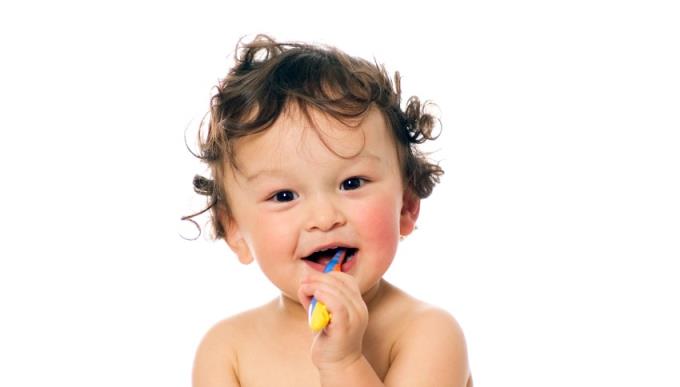Many mothers think that when the baby teeth grow, they will fall sooner or later, so there is no need to take care and preserve them. Shouldn't mother, "the root" of the child will be healthy and beautiful or not thanks to this early stage of care. Help children give up the following 9 bad habits to prevent dental diseases, mom!
1 / The habit of sucking on a pacifier , sucking fingers
In addition to breast-feeding or bottle-feeding, mothers often let babies suck on pacifiers to help babies sleep more easily , as well as to comfort babies when they are fussy and uncomfortable. However, do you know the consequences if you overuse this artificial nipple? Children are very susceptible to oral diseases, typically the deformed jaw, abnormal facial muscles, arch teeth and tongue.

You should not neglect to take care of your child's teeth in the first years of life
Just like sucking on a pacifier, finger sucking habits can also cause a child's upper and lower jaw to mismatch when biting. When you suck on the nipples or fingers too much, in the long run it will put pressure on the jaw, causing the teeth and jaw to develop incorrectly. At this time, the risk of a child being called is very high. Therefore, when the child is 1 year old, the mother should find a way to remove the baby's pacifier to prevent dental diseases!
2 / The habit of pushing the tongue
The front tongue pushback is quite common in young children. This habit negatively affects the child's oral health. When doing the swallowing movement, if you push the tongue forward, in the long run, it will deviate teeth. Specifically, the front, upper and lower teeth are pushed forward, spaced apart, causing jaw chatter.
3 / Children have a habit of breathing through the mouth
Add one more cause of baby teeth deviation: Breathe through your mouth. Usually, children with upper respiratory problems, difficulty breathing, rhinitis, swollen tonsils, plips, very often have trouble breathing through the mouth. This breathing method inadvertently dries out the mucosa, easily causes cavities, chewing jaws, incorrect position of teeth, disproportionate facial skeletal system, and occlusion disorder.
The mother should take the baby to the doctor if the child has a habit of breathing through his mouth. Not to mention the consequences for the oral health in the future, it is important that the child is wearing some serious medical condition.
4 / The baby often grits his teeth
Children often grind their teeth while sleeping. This can be seen as a response to nervous stress, which mostly occurs in children with irritable nervous systems, epilepsy, encephalitis, or digestive disorders. This tooth grinding is also quite related to the growth and development of teeth, causing negative consequences to the placenta such as teeth, muscles, jaws, temporal joints.
Most babies have this disorder when their baby teeth start to grow around 6 months old, or permanent teething at 5 years old. after that, they usually end by themselves when they are 12 years old. The mother should let the baby go to the dentist specialist to promptly treat facial and jaw bone deformities.

Teething in children and dental care procedures Do you know about teething procedures in your baby and how to take care of your baby's teeth to avoid tooth decay or dental infections? Refer to the following information now!
5 / Children swallow toothpaste
Toothpaste for children is often sweet and fragrant, so many children swallow toothpaste after brushing. This is very dangerous with the teeth and digestive system of the baby. When swallowing cream, children are very susceptible to excess fluorosis called Fluorosis. If you find unusual white or brown spots on your child's teeth, it is a sign of the disease.
6 / The habit of sucking while eating
This bad habit not only harms the mouth, but also affects the physical and weight of the child. When you hold food for too long, digestive enzymes in the salivary glands will convert food into sugars, stick to the root, causing inflammation, ulcers and tooth decay.
At the same time, digestive enzymes are not enough for the absorption of food, resulting in anorexia, weight loss, and malnutrition. With babies often suckling when eating, mothers should feed them little by little, divide into many small meals and change the diet regularly to make the baby more delicious.
7 / Eat and drink sweets before bed
Many mothers give their baby sweet milk, chocolate, juice, or simply give their baby a cough syrup before bed but forget to rinse their mouth. These drinks contain a lot of sugar, leading to tooth decay. Eating a lot before bed is also very easy to make children gain weight and obesity. Mom should be limited!
8 / Eating habits hot and cold together
Alternating hot and cold instant food is very harmful to teeth. Baby teeth, especially baby teeth, are extremely sensitive to changes in temperature. This habit can lead to pulp inflammation and other serious dental diseases in the long term.
9 / Snacking too much
When children eat too much junk food, usually confectionery, processed foods, the risk of tooth decay is very high. In addition, the child's tooth enamel is also negatively affected. Mothers should limit snacking, especially before going to bed.
MarryBaby













